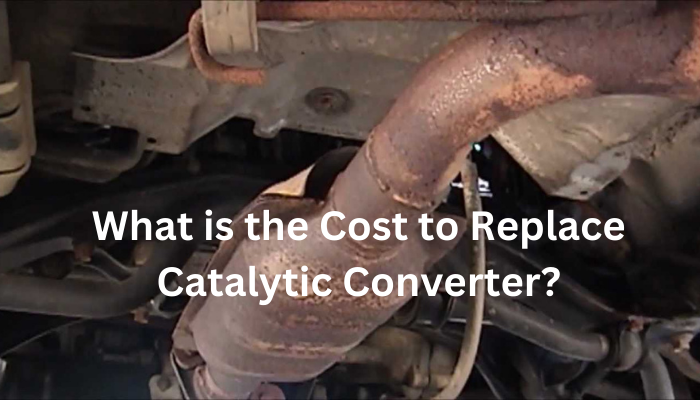A catalytic converter is a part in your car that cleans up harmful gases from the engine before they go into the air. It’s a small but important part of your vehicle’s exhaust system, working to keep the environment a bit cleaner as you drive. In this blog post we will talk about how much will it cost you to replace your Catalytic Converter.
As an experienced mechanic, I understand the importance of knowing the expense associated with this repair. Let’s delve into the factors that influence the cost of catalytic converters and provide approximate costs in dollars to give you a better idea of what to expect. The cost might vary depending upon a lot of factors.
Factors Affecting Cost of Replacing
1. Type of Catalytic Converter:
Catalytic converters come in two main categories: OEM (Original Equipment Manufacturer) and aftermarket converters.
- OEM converters, designed to meet vehicle manufacturer specifications, are often more expensive. Approximate cost: $300 to $1,000+.
- Aftermarket converters are generally more affordable. Approximate cost: $100 to $500+.
2. Vehicle Make and Model:
- The specific make and model of your vehicle significantly impact the catalytic converter’s cost. Some vehicles have complex emissions systems that require specialized converters, which can be pricier. Approximate cost: Varies widely.
3. Emissions Standards:
- Different regions have varying emissions standards. Converters designed to meet stricter regulations can be more expensive due to advanced technology and materials. Approximate cost: Varies based on local regulations.
4. Converter Material:
- Converters can be made of different materials, including ceramic and metal. Ceramic converters are typically more expensive but known for their efficiency. Approximate cost: $300 to $1,000+.
- Metal converters are usually more affordable. Approximate cost: $100 to $500+.
5. Installation Costs:
- Installation costs can vary depending on the complexity of your vehicle’s exhaust system and local labor rates. Labor charges can add significantly to the overall repair expense. Approximate cost: $100 to $500+.
6. Warranty:
- Many converters come with warranties that can impact the cost. Some high-quality converters may be more expensive upfront but offer longer warranties, potentially saving you money in the long run. Approximate cost: Varies based on warranty coverage.
7. Local Labor Rates:
- Labor rates at repair shops can vary by location. Larger metropolitan areas often have higher labor rates compared to rural areas. Approximate cost: Varies based on local labor rates.
To provide a rough estimate, you can expect the cost of replacing a catalytic converter to range from approximately $300 to $1,500 or more, depending on the factors mentioned above. It’s essential to do thorough research, consider the value and quality of the converter you choose, and obtain quotes from local repair shops for a more precise cost estimate.
In some cases, you might also explore the option of using a used or remanufactured catalytic converter. However, be cautious when considering this route, as it may not always be a reliable long-term solution.
Ultimately, when dealing with catalytic converter issues, it’s advisable to consult with a professional mechanic who can provide an accurate diagnosis and guide you in selecting the most cost-effective and reliable solution for your specific vehicle.
Tips for Cost Savings
Exploring Aftermarket Options:
Here’s a money-saving maneuver – consider exploring aftermarket options for your catalytic converter. While OEM (Original Equipment Manufacturer) parts are made by your car’s brand, aftermarket parts, often more budget-friendly, can get the job done. Just ensure they meet emission standards and come from a reputable source.
Comparing Quotes from Different Auto Repair Shops:
Knowledge is power, especially when it comes to quotes. Before committing to a replacement, gather quotes from different auto repair shops. Prices can vary, and this savvy shopping tactic ensures you’re not overpaying for the same service. It’s a bit like hunting for the best deal in a car repair marketplace.
Understanding Warranty Options:
Don’t underestimate the power of a warranty. When investing in a new catalytic converter, check for warranty options. Some replacements come with warranties that can save you from unexpected future expenses. It’s like having a safety net for your recent investment.
In the quest for cost savings, these tips can be your trusty companions. So, tighten those financial seatbelts as we navigate the twists and turns of making your catalytic converter replacement a budget-friendly venture.
Conclusion
By staying ahead of catalytic converter issues, addressing them promptly, and making informed decisions about replacements, you’re not just saving costs in the short term; you’re investing in the longevity and optimal performance of your vehicle in the long run.
As the dust settles on our exploration of catalytic converters and their associated costs, remember: your car’s health is a journey, not a destination. Stay informed, stay proactive, and keep those wheels turning smoothly. Until next time, happy driving!


